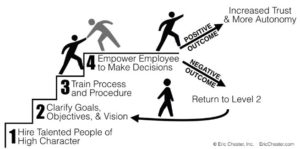In this final part of the series, we’ll combine everything to create a successful job search strategy.
It’s game time
The main thing to remember during your job search is that it’s not about you… it’s about what you can do for the hiring manager.
You have between 6-10 seconds to catch a recruiter’s attention with your resume. Write or edit it with the hiring manager’s perspective in mind. What’s important to them? Which of your demonstrated skills are valuable to the role they are recruiting for?
Your message should be weighted towards accomplishments, with a brief description of your responsibilities. Your accomplishment statements should sound like “Recruited and directed a team of 10 to exceed company goals by 10% and a ranking of 2 out of 20 divisions”. Make it meaningful for the hiring manager.
TIP
When you fold the first page of your resume in half, is there enough compelling information visible to cause the reader to keep reading and/or to call you in for an interview?
More than ¾ of all jobs are landed through someone the candidate knows. LinkedIn is a key to building a powerful network. LinkedIn is not a spectator sport. You need to build a full profile with a compelling message that utilizes key search words and phrases that will get past the Applicant Tracking System (ATS) and to be found by recruiters. And you need to be active on the platform on a very regular basis. Post, repost, comment on other posts, and develop meaningful relationships with your network.
TIP
Block off time a minimum of 3-days a week to work on developing your profile, connecting with people, and making yourself visible on the platform.
The 3 P’s of interviewing
Your resume might have gotten you in the door, but you still need to win the job.
The 3 P’s of interviewing, “Prepare, Process and Practice”, will increase your confidence, reduce stress, and help you to perform the best you can in your interview.
Prepare by learning as much as you can about the industry, marketplace, role’s responsibilities, and the interviewer.
Have a Process for answering interview questions, like STARS (Situation, Task, Action, Result, So why am I telling you this?) so your responses are clear, concise, and impactful.
Practice your interview answers so that you are comfortable with how you want to deliver your responses. Try not to have the first time the words come out of your mouth be in that interview.
TIP
Practice in front of a mirror, record your interview answers and/or find someone who will role play an interview with you and who will give you good, honest, and informed feedback.
Your resume, LinkedIn profile, and interviewing skills are best developed with outside input. Have at least one other person look over your work and practice with you on your interviewing skills. Someone who will be straightforward and honest with you and who can offer you good advice and guidance.
If you follow this general approach you will land in a good place… a place you were meant to be. A place that meets your personal, professional, and family needs and desires. You can be the person who loves getting up in the morning to get after another great day. You can be the person who loves their job.
And most importantly, you can be a person who has survived and thrived after a job loss!
Steps to Survive and Thrive a Job Loss
- Take a deep breath and focus on the things you are grateful for in your life
- Have short-term goals so you can measure the progress you are making to get where you want to be
- Include exercise or meditation as part of your daily plan to have a sound mind & body for your search
- Reconnect with your family
- Take time to figure out what you want to do next. You know what you’ve done professionally to this point, now it’s time to consider not only what your professional needs are, but what your personal and family needs are as well
- Seek out as much information as possible about any companies that might be a target for you and find as many people as you can to help with your preparation… Learn to love LinkedIn!
- Use whatever resources you can find to build your resume and LinkedIn profile geared towards the role you are interested in. Get a mentor or coach to look at it and to challenge you to make it a great resume
- Practice interviewing skills, out loud and especially focus on those questions you think will be toughest to answer
- Find enjoyment in your life!!!
Ken Sher is President of Sher Coaching and is dedicated to improving individual and team performance by focusing on Career Coaching and Executive Coaching. To learn how the TRUST Success Model can help you with your job search or improve your team’s performance Book an appointment to schedule a complimentary coaching session, visit his website at shercoaching.com or email him at Ken@shercoaching.com




